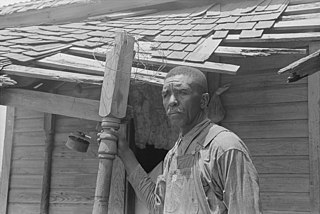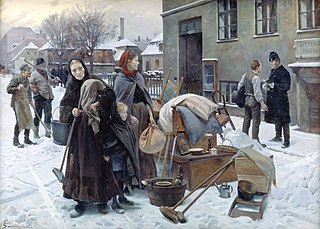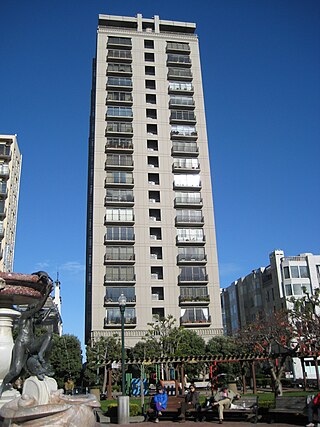
A tenant farmer is a person who resides on land owned by a landlord. Tenant farming is an agricultural production system in which landowners contribute their land and often a measure of operating capital and management, while tenant farmers contribute their labor along with at times varying amounts of capital and management. Depending on the contract, tenants can make payments to the owner either of a fixed portion of the product, in cash or in a combination. The rights the tenant has over the land, the form, and measures of payment vary across systems. In some systems, the tenant could be evicted at whim ; in others, the landowner and tenant sign a contract for a fixed number of years. In most developed countries today, at least some restrictions are placed on the rights of landlords to evict tenants under normal circumstances.

A landlord is the owner of a house, apartment, condominium, land, or real estate which is rented or leased to an individual or business, who is called a tenant. When a juristic person is in this position, the term landlord is used. Other terms include lessor and owner. The term landlady may be used for the female owners. The manager of a pub in the United Kingdom, strictly speaking a licensed victualler, is referred to as the landlord/landlady. In political economy it refers to the owner of natural resources alone from which an economic rent is the income received.

Eviction is the removal of a tenant from rental property by the landlord. In some jurisdictions it may also involve the removal of persons from premises that were foreclosed by a mortgagee.
A leasehold estate is an ownership of a temporary right to hold land or property in which a lessee or a tenant holds rights of real property by some form of title from a lessor or landlord. Although a tenant does hold rights to real property, a leasehold estate is typically considered personal property.
Property management is the operation, control, maintenance, and oversight of real estate and physical property. This can include residential, commercial, and land real estate. Management indicates the need for real estate to be cared for and monitored, with accountability for and attention to its useful life and condition. This is much akin to the role of management in any business.
Lost, mislaid, and abandoned property are categories of the common law of property which deals with personal property or chattel which has left the possession of its rightful owner without having directly entered the possession of another person. Property can be considered lost, mislaid or abandoned depending on the circumstances under which it is found by the next party who obtains its possession.
Rent control in Ontario refers to a system of rent regulation in Ontario, Canada which limits the amount by which the rent paid by tenants for rental accommodation can increase. It applies to any unit that was first occupied for residential purposes before November 15, 2018.
The assured shorthold tenancy (AST) is the default legal category of residential tenancy in England and Wales. It is a form of assured tenancy with limited security of tenure, which was introduced by the Housing Act 1988 and saw an important default provision and a widening of its definition made by the Housing Act 1996. Since 28 February 1997 in respect of accommodation to new tenants who are new to their landlords, the assured shorthold tenancy has become the most common form of arrangement that involves a private residential landlord. The equivalent in Scotland is short assured tenancy.
The National Conference of State Legislatures (NCSL), established in 1975, is a "nonpartisan public officials’ association composed of sitting state legislators" from the states, territories and commonwealths of the United States.
Landlord and Tenant Act is a stock short title used for legislation about rights and responsibilities of landlords and tenants of leasehold estate in Hong Kong, the United Kingdom and the United States.
Under the provisions of the United Kingdom Housing Act 2004 every landlord or letting agent that takes a deposit for an assured shorthold tenancy in England and Wales must protect the deposit under an authorised tenancy deposit scheme. The regulations came into effect on 6 April 2007, and were amended by the Localism Act 2011 and the Deregulation Act 2015. Most recently the Tenant Fees Act 2019 provided further protections for tenants.

The Landlord and Tenant Act 1985 is a UK Act of Parliament on English land law. It sets bare minimum standards in tenants' rights against their landlords.
The Landlord and Tenant Law Amendment Act, Ireland, 1860 or the Landlord and Tenant Law Amendment (Ireland) Act 1860, better known as Deasy's Act, was an Act of Parliament preceding the agrarian unrest in Ireland in the 1880s, the "Land War".

Landlord–tenant law is the field of law that deals with the rights and duties of landlords and tenants.
The Ellis Act is a 1985 California state law that allows landlords to evict residential tenants to "go out of the rental business" in spite of desires by local governments to compel them to continue providing rental housing.
"'Tenant screening'" is used primarily by residential landlords and property managers to evaluate prospective tenants. The purpose is to assess the likelihood the tenant will fulfill the terms of the lease or rental agreement and will also take great care of the rental property in question. The process culminates in a decision as to whether to approve the applicant, approve the applicant conditionally, or deny tenancy.
The Landlord and Tenant Board is an adjudicative tribunal operating in the province of Ontario that provides dispute resolution of landlord and tenant matters under the Residential Tenancies Act, 2006. It is one of the 13 adjudicative tribunals overseen by the Ministry of the Attorney General that make up Tribunals Ontario.
Rent regulation in Canada is a set of laws and policies which control the amount by which rental prices for real property can increase year to year. Each province can pass legislation, where the purpose is to limit rent prices increasing beyond what is affordable for most home dwellers.

Eviction in the United States refers to the pattern of tenant removal by landlords in the United States. In an eviction process, landlords forcibly remove tenants from their place of residence and reclaim the property. Landlords may decide to evict tenants who have failed to pay rent, violated lease terms, or possess an expired lease. Landlords may also choose not to renew a tenant's lease, however, this does not constitute an eviction. In the United States, eviction procedures, landlord rights, and tenant protections vary by state and locality. Historically, the United States has seen changes in domestic eviction rates during periods of major socio-political and economic turmoil—including the Great Depression, the 2008 Recession, and the Covid-19 pandemic. High eviction rates are driven by affordable housing shortages and rising housing costs. Across the United States, low-income and disadvantaged neighborhoods have disproportionately higher eviction rates. Certain demographics—including low income renters, Black and Hispanic renters, women, and people with children—are also at a greater risk of eviction. Additionally, eviction filings remain on renters' public records. This can make it more difficult for renters to access future housing, since most landlords will not rent to a tenant with a history of eviction. Eviction and housing instability are also linked to many negative health and life outcomes, including homelessness, poverty, and poor mental and physical health.
The Model Tenancy Act, 2019 is a proposed tenancy law by the Government of India, designed to overhaul the tenancy market in India.





